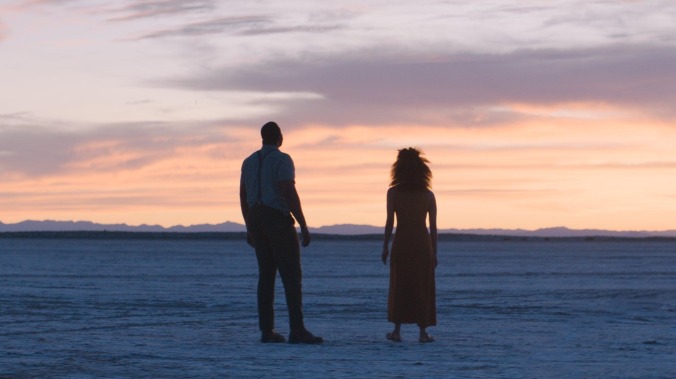The “before life” drama Nine Days is a bold vision of the great beyond
Winston Duke and Zazie Beetz are terrific in a movie that makes strong choices, but often at the expense of subtlety


The thoughtful and ambitious indie drama Nine Days is writer-director Edson Oda’s debut feature, but it has such a distinct look and feel that it comes across like the work of a more seasoned artist. This is both a plus and a minus. More often than not, it’s better when filmmakers have a point-of-view, a sense of style, and something to say—all of which is undeniably true of Oda. But Nine Days resonates at such a distinct frequency that some may find it hauntingly beautiful (and have found it so, ever since the film debuted at Sundance back in 2020) while others may find it much too blaring.
Winston Duke plays Will, an old soul who once spent time in a human body on Earth and has since passed on to serve the universe as a kind of celestial HR director, weighing the applications of new souls for the important job of “being alive.” He works out of a quaint farmhouse on a vacant plain, where he monitors the experiences of the souls he’s chosen on a bank of vintage TV sets, hooked up to VCRs. He takes hand-written notes on the especially stressful or triumphant moments in his people’s lives, storing his observations in a creaky, overstuffed file cabinet.
When his favorite human, Amanda, dies unexpectedly in a car accident while on the brink of success as a classical violinist, Will sinks into a funk, just as he’s in the process of selecting the soul to replace her. He spends his days interviewing the applicants, each with complex and seemingly fully formed personalities, all played by fully grown adult actors like Zazie Beetz, Bill Skarsgård, and Tony Hale. Only one candidate will advance. The rest—no matter how much of an impression they make—will disappear completely. Will spends his nights reviewing footage of Amanda and looking over his notes, wondering if she might’ve crashed her car on purpose—and if so whether that means he failed when he selected her soul. Meanwhile, the never-born Kyo (Benedict Wong) shadows his friend and colleague, serving as Will’s confidant.
Throughout Nine Days, Oda makes choices that are easy to nitpick. Why is Will’s technology so old-fashioned? Why are the souls sometimes completely ignorant of what life is like on Earth while at other times they speak and behave as though they’ve been alive for decades? How does this cosmic bureaucracy actually work? But these aren’t crucial questions, ultimately. Nine Days’ ante-life looks the way it looks and features the metaphysical mechanisms it does because that’s how Oda conceived it. No further explanation is needed.
That said, it’s hard not to compare Nine Days to some of the other movies that have speculated on how the world beyond ours actually functions: films like Pixar’s Soul or Albert Brooks’ Defending Your Life, which have fleshed out how their creators think the universe works in ways that are strikingly imaginative and clever, and more detailed than Nine Days. It’s also hard not to think of Hirokazu Kore-eda’s 1998 masterpiece After Life, which has a similar low-fi setting but considers life from its other end, at an office where souls that have just died have to select one memory to live inside for eternity. (In what may be a nod to After Life, Oda has Will and Kyo give their rejected applicants a chance to experience one perfect moment before they return to the void.)
What sets those other movies apart from Nine Days is a sense of whimsy largely absent from Oda’s film, which is suffused with a sorrowful ache. Nine Days is also more inclined to lean on generalities about what “living” actually means. Much of the plot involves Will testing his applicants by showing them scenes of real-life crises and asking them what they would do. The emphasis throughout is on big emotions and instincts: fear, courage, disgust, exultation, etc. The process is an exhausting grind for the characters, and over the course of the two-hour running time, it can become one for the audience as well.
Where Nine Days excels is as a showcase for its cast, who under Oda’s direction give their roughly sketched-out characters enough dimension to make the whole oddball job interview genuinely affecting. Duke is outstanding as an officious employee who tries—and largely fails—to keep his feelings from bubbling to the surface. Beetz is terrific too as an applicant who mostly chooses not to engage with the process, preferring instead to make the most of whatever time she has. And Hale is disturbingly good as someone whose ingratiating demeanor and glib responses to Will’s questions mask a deeper insecurity.
These performances work so well because they’re grounded in specific reactions to the immediate circumstances. It’s admirable that Oda so often goes broad and grand with his depiction of the human experience, focusing more often than not on the extremes of depression and ecstasy. And again, many viewers are bound to be moved by the choices he makes, which are clear and confident. And yet it’s oddly more touching when Hale’s person-in-training asks if he can ditch the tests for an afternoon and just have a beer with Will. This too is part of life: to want to chill for a bit, rather than facing the big questions every waking second. A Nine Days that played more of the soft notes alongside the bold ones might’ve resonated more clearly.